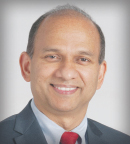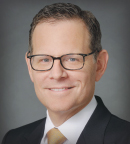With this issue of The ASCO Post, we introduce a new feature, View From the Top: The Future of Cancer Care Delivery, which will explore how leaders in oncology are developing strategies to ensure continued innovative oncology care in an ever-changing health-care environment. In this inaugural column, Guest Editor Jame Abraham, MD, FACP, talked with Clifford A. Hudis, MD, FASCO, FACP, Chief Executive Officer (CEO) of ASCO, Executive Vice Chair of ASCO’s Conquer Cancer Foundation, and Chair of ASCO’s CancerLinQ. They discussed how ASCO is addressing the challenges of rising inflation, stagnant physician reimbursement rates from Medicare and Medicaid, and increases in oncology drug costs, among other critical issues. Here are excerpts from their conversation.

Jame Abraham, MD, FACP

Clifford A. Hudis, MD, FASCO, FACP
Multiple Challenges
Dr. Abraham: As a department chair of a large cancer program at the Cleveland Clinic and a member of the hospital leadership, I am constantly reminded of the multiple challenges facing our health-care environment, including rising inflation, oncology workforce shortages, and reduced reimbursement from Medicare and Medicaid. How is ASCO addressing these challenges?
Dr. Hudis: The macro trends you describe are absolutely real, and the truth is they extend beyond medicine. But cutting to the real question that has our attention these days, how do we foresee what it means to be an oncology professional in the years ahead and maintain professionalism? How do we enable our members to keep getting even better at what they do and deliver ever-improving, higher-quality care in the face of these challenges?
This is an age-old issue, because even before the current economic situation, the cost of health-care over the decades has been rising faster than inflation. So we do have this chronic problem, and people have been looking across all of health care for opportunities to generate savings. It really depends on your perspective about how much waste you think there is in the system or how skeptical you are that the waste can be eliminated from the system to realize real savings. But I do think there are always potential efficiencies. At a high level, the more standardization we bring to the system—the more consistently we do things—the more we tend to find lower costs.
Secondly, of course, is the degree to which we agree to eliminate wasteful or expensive approaches to treatment and care that do not yield superior outcomes. And the way we do that is through a combination of evidence-based medicine and compliance with clinical pathways, along with other approaches to decrease drug and treatment spending while maintaining high-quality care.
ASCO Membership Perspective
Dr. Abraham: Do you have any sense of how these issues are affecting ASCO’s members?
Dr. Hudis: Data from surveys show there are general concerns. For example, the burden of practicing in this environment is perhaps most keenly felt in the area of prior authorization. I mention that because although the intent with prior authorization is to ensure compliance and presumably contain cost, in practice, it ends up being one of the biggest burdens our members face and something we are working very hard to address.
On a somewhat broader level, I think this does translate into workforce challenges, and I want to go very specifically to the problem of burnout. There probably has always been physician burnout, but it is also the case that more and more people are recognizing signs of it in themselves and asking for assistance in dealing with the problem, and that is a place where we really can step up.
There are legislative interventions that we have been supporting, as well as practical ones. In fact, the most recent retreat of ASCO’s Board of Directors was focused on the health of the workforce. And I want to point out something in case people are not attuned to this problem and that is that unless we have a workforce that feels satisfied, finds joy in their work, and is able to focus on the care and well-being of their patients, patient care will ultimately suffer in terms of both access and quality. So this is a fundamental challenge for us right now.
Patient Advocacy
Dr. Abraham: As you mentioned earlier, our ultimate responsibility is to our patients, who really bear the burden of high drug prices. How is ASCO, through its advocacy, working with policymakers to promote drug affordability and access for all patients with cancer?
Dr. Hudis: ASCO does not set drug prices, and we do not weigh in on the specifics of drug pricing. However, what we really argue for is that patients with a cancer diagnosis have access to the best available therapy, so they can have the best possible outcome. And, often, that means having access to expensive drugs. To ensure that patients have access to the best therapy, we develop and publish evidence-based clinical practice guidelines, which I suppose might give policymakers and payers a level ground they could use to determine the value of new cancer therapies based on clinical benefit.
ASCO currently has a pilot project underway called the ASCO Patient-Centered Cancer Care Certification (APC4), which will be launched more broadly and with a catchier name in a few months. This program assesses the quality of cancer care in seven domains and enables practices to participate in the transformation to value-based care. We believe this program will provide at least a piece of the solution to ensuring access to care for all patients.
We promote these approaches through our advocacy work. For example, we use ASCO’s ACT network to distribute letters from our members to relevant members of Congress. We also make visits to Capitol Hill and reach out to employers and payers to educate them on these matters.
In addition, we actively support specific legislative efforts to reduce the financial barriers to care, including reducing the ancillary costs of clinical trial participation, supporting bans on copay accumulator programs, and addressing challenges posed by pharmacy benefit managers. We are also increasingly collaborating with ASCO’s State/Regional Affiliate Councils and other organizations to unify and bolster our impact on both the federal and state levels.
Our community probably has to become gradually more specialized, because there is just a limited capacity of how much an individual can know about every type of cancer.— Clifford A. Hudis, MD, FASCO, FACP
Tweet this quote
Health-Care Marketplace
Dr. Abraham: Another concern is a rise in mergers between retail and health-care companies, such as Amazon, Best Buy, and Atrium Health (part of the nonprofit health system Advocate Health), which are integrating into the home health-care market. What is the impact of these players on cancer care?
Dr. Hudis: This is a daunting challenge for us. Consolidation and mergers of the type you describe have the potential to disrupt the physician-patient relationship and continuity of care, and this is something we are very concerned about. What I can say is we are watching these developments very closely.
In the end, the marketplace is going to drive these developments, and we are going to have to figure out how to help our members maintain the high quality of care that we expect to deliver as these changes evolve. If they are incompatible with delivering high-quality care, we will obviously be advocating for a different approach.
Nurturing Innovation
Dr. Abraham: In our changing financial environment, how will we continue to maintain a focus on innovation?
Dr. Hudis: For nearly a century, America has distinguished itself with specific investments in science and technology, especially in cancer. In recent years, we have enjoyed strong bipartisan support for continuing that investment. I know these times are tough, and the budget for the next year will certainly be contentious. But if history is a guide, I remain cautiously optimistic that the parties will come together, and we will continue to make the kind of uniquely American investment in science, research, and development that we have in the past.
It is worth noting that in most domains, competition tends to drive innovation in ways that deliver ever-improving products and care at lower costs. I see a connection between that and the multiyear pilot program we initiated in rural Montana to increase access to high-quality, equitable care through a hub-and-spoke care delivery model with clinics staffed by nononcology professionals at regional sites. That kind of innovation may be another way we can distribute cutting-edge treatment at lower cost despite constrained resources.
Exciting Advances and Looming Challenges
Dr. Abraham: Lastly, what excites you about the future in cancer care?
Dr. Hudis: This is both the best of times and the worst of times in health care. We are in an exciting time of rapid scientific discoveries that translate into remarkable new treatments for patients that are more targeted and less toxic than many older approaches. As a result, cancer mortality rates keep dropping, and survival is dramatically prolonged in some cases.
Further, these advances can now reach more patients because of continued progress in expanding Medicaid to more states, despite long-standing resistance. Although the battle is not won, it is at least heading in the right direction.
Finally, technology is helping expand ASCO’s global reach. The Internet has made it possible for us to have an Annual Meeting now with participants from more than 130 countries, so our reach is greater than ever before.
All of these advances are wonderful and are making a difference in patient care. However, the looming challenge, as I mentioned earlier, is that our workforce is stressed and disparities remain in access to care. At the same time that advances in medicine and technology are happening so quickly, it can be hard for some of us to learn and keep up with all the new information.
A solution may be that our community probably has to become gradually more specialized, because there is just a limited capacity of how much an individual can know about every type of cancer. So, as cancer medicine becomes better understood and provides more options for patients, individuals are likely to narrow their scope so that they can stay current in their area of specialization.
I’m optimistic that we will be able to figure all this out and meet the challenge. We always have in the past, and I see no reason why we won’t overcome these challenges in the future. But it won’t just happen. We will have to do the hard work of putting systems in place to improve the lives of both our workforce and our patients.
DISCLOSURE: Dr. Hudis is Chief Executive Officer of ASCO.
Dr. Abraham is Chairman of the Department of Hematology and Medical Oncology at Cleveland Clinic and Professor of Medicine at Lerner College of Medicine.

